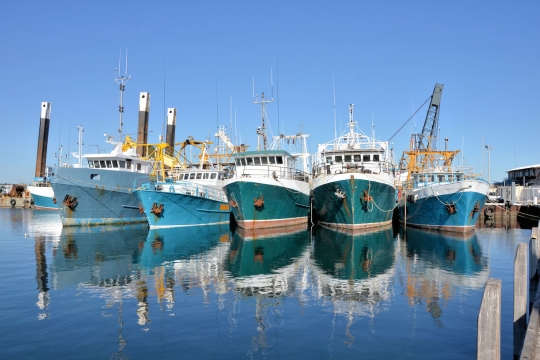Squid fishing along the coast near Jeffreys Bay in the Eastern Cape, South Africa, is a precarious business for the hand-line fishermen employed to work on the small commercial boats that fish these waters. The fishermen are paid by the number of squid they haul onto the boat by hand. This means their incomes can fluctuate unpredictably, depending on the health of the resource during a fishing season, the quality of the water on any given day, and how skilled the skipper is. If the water is murky, poor visibility can lower the catch. If the boat captain doesn’t know his stuff, he might not find the squid.
Another problem for the squid fishermen is that the fishery shuts down for four months of the year. This ‘closed season’ is necessary to allow the fishery to recover each year. Unless these fishermen find other work or an alternative livelihood during the closed season, they have no income for a third of the year.
Since most of the catch is exported, the prices earned by the industry on the global market translate into potential earnings for fishers and management. The fishers, like their employers, are vulnerable to the volatility of international exchange rates.
These important social factors could threaten the overall sustainability of the squid fishing sector, according to resource economist associate professor Anthony Leiman, with the University of Cape Town’s Environmental Policy Research Unit (EPRU). Leiman is part of a research collaboration between the University of Portsmouth in the UK, the South African government, and Nelson Mandela University, which is assessing the overall sustainability of this small but regionally-important fishing industry.
The research collaboration began in 2017, following a severe crash in squid stocks in 2013.
The squid industry here produces a high-quality, export-grade catch and while the sector’s sustainability has been thoroughly considered from a scientific and economic perspective, says Leiman, the political and social factors that contribute to the overall sustainability need greater thought.
‘Fishermen are the dominant earners in the Jeffreys Bay community, so when their incomes rise, the local economy rises with them; when the catch goes down, the economy also suffers,’ says Leiman.
During low seasons, the fishers and their families have less money to spend in the local shops, which impacts on businesses in the town. Fishing families also often end up taking on high-interest debt with small money loan operations to tide them over during these slow seasons.
These economic ripple effects were seen clearly when the squid fishery crashed in 2013. Since then, catches have now bounced back by almost 600 per cent, which shows the potential volatility of the fishery.
Losing rural safety nets; politics and policies
‘Most of these fishermen come from rural areas in KwaZulu Natal and the Eastern Cape. In the past, people would return home during the closed season, where they had alternative livelihoods. But many have now settled permanently in the Jeffreys Bay area, and may have lost the social safety net that they once had.’
Leiman and research associates Peter Mthembu and Jorich Loubser are looking at the social and political factors underlying the sustainability of the squid industry. They say that industry employers are trying to offset these risks for their workers in a few ways. Some employers have recommended ‘smoothing’ the fishermen’s earnings by paying year-round monthly wages, rather than piece-meal takings. However, their findings show that most fishermen still prefer to take their earnings as they haul in the catch.
One of the political solutions to offset this vulnerability, proposed by the National Department of Forestry, Fisheries and Environmental, is to allocate 25 per cent of the fishing quota to these small community fishers. The new quotas are set to be rolled out in 2020, and will apply for fifteen years.
The thinking behind this extension of small scale fishing rights is that fishermen will have shares in the industry, rather than just draw wages from it. This is a ‘laudable aim’, according to researchers, but one that could challenge the viability of the industry.
‘Squid fishing needs a well-equipped vessel that can stay out at sea for a few weeks at a time. It needs flash-freezing facilities to freeze the catch within hours of it being caught, and this needs a diesel generator on board. The boat also needs a licensed skipper, an engineer, a cook, and the fishermen themselves,’ explains Leiman.
Few of these permit holders would have the means to supply their own vessels, and will need to go into a contractual relationship with existing boat owners if they want to catch their quotas. The uneven balance of power in these relationships may not leave fishers better off.
Another threat, identified during the early phase of the research, is the question of accessing the markets.
‘The value of this industry is that the squid are caught on hand lines, rather than trawled. It’s a high quality product which sells into the international market. But accessing the market would be difficult for a community cooperative - they’d need to sell to local firms with international trading experience. Again, the balance of power is not symmetrical in these relationships.’
The newly appointed Minister of Forestry, Fisheries and Environmental Affairs, Barbara Creecy, has inherited this policy position from the outgoing minister, which has ‘created expectation’ in the community.
At the moment, there’s a large difference in knowledge and understanding between management and fishers in the industry, and a great deal of mistrust, say the researchers. There is real concern that the relationships needed to see these communal rights being efficiently exploited would be inherently fragile.
Reducing the level of dependence on an unstable resource is going to be central to the fishery’s social and political sustainability. The state may need to consider other employment options in and around Jeffreys Bay, to boost income opportunities during the closed fishing season, beyond public works projects.
The study is expected to continue for another two years.
